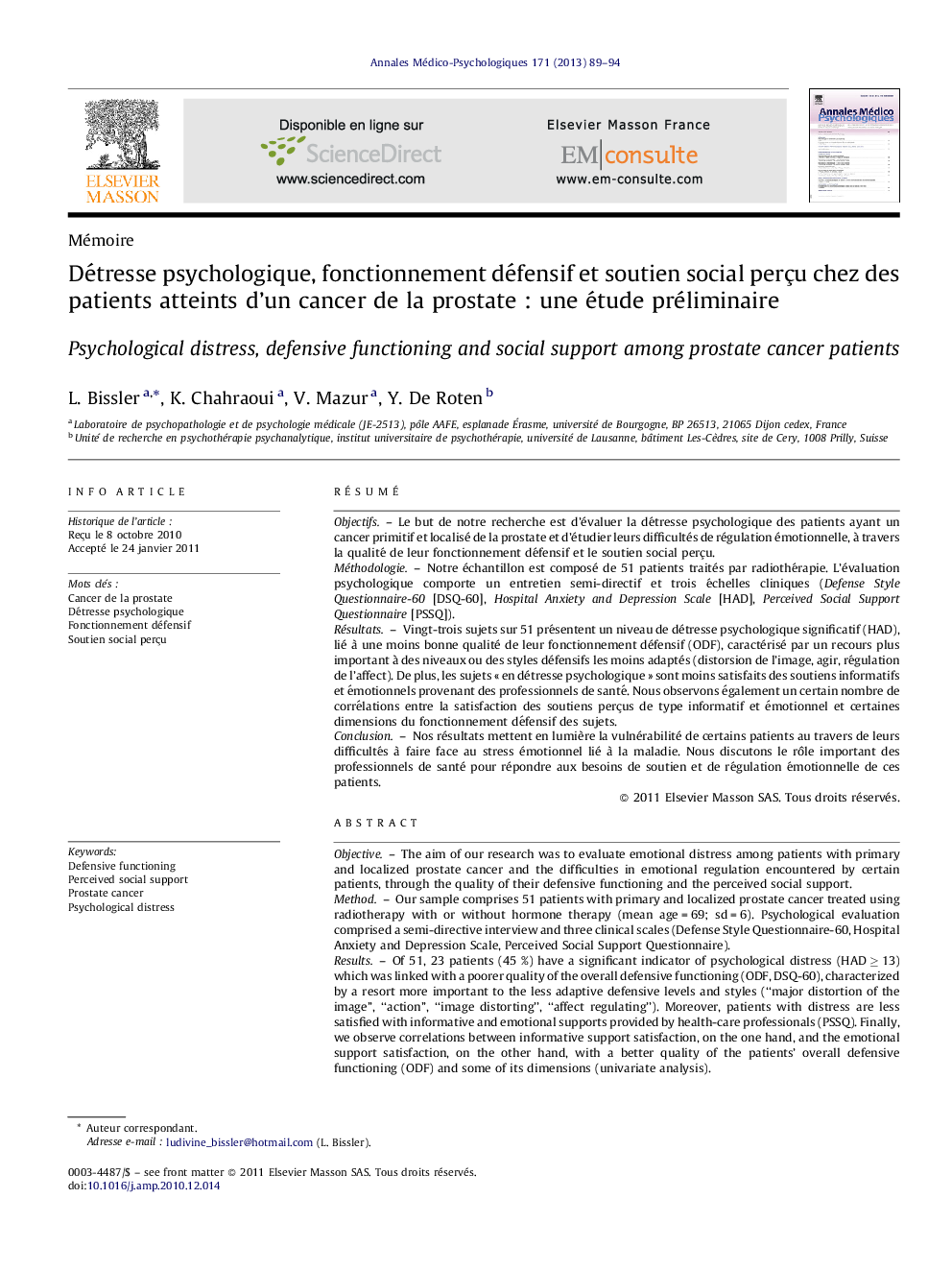| کد مقاله | کد نشریه | سال انتشار | مقاله انگلیسی | نسخه تمام متن |
|---|---|---|---|---|
| 312563 | 534228 | 2013 | 6 صفحه PDF | دانلود رایگان |

RésuméObjectifsLe but de notre recherche est d’évaluer la détresse psychologique des patients ayant un cancer primitif et localisé de la prostate et d’étudier leurs difficultés de régulation émotionnelle, à travers la qualité de leur fonctionnement défensif et le soutien social perçu.MéthodologieNotre échantillon est composé de 51 patients traités par radiothérapie. L’évaluation psychologique comporte un entretien semi-directif et trois échelles cliniques (Defense Style Questionnaire-60 [DSQ-60], Hospital Anxiety and Depression Scale [HAD], Perceived Social Support Questionnaire [PSSQ]).RésultatsVingt-trois sujets sur 51 présentent un niveau de détresse psychologique significatif (HAD), lié à une moins bonne qualité de leur fonctionnement défensif (ODF), caractérisé par un recours plus important à des niveaux ou des styles défensifs les moins adaptés (distorsion de l’image, agir, régulation de l’affect). De plus, les sujets « en détresse psychologique » sont moins satisfaits des soutiens informatifs et émotionnels provenant des professionnels de santé. Nous observons également un certain nombre de corrélations entre la satisfaction des soutiens perçus de type informatif et émotionnel et certaines dimensions du fonctionnement défensif des sujets.ConclusionNos résultats mettent en lumière la vulnérabilité de certains patients au travers de leurs difficultés à faire face au stress émotionnel lié à la maladie. Nous discutons le rôle important des professionnels de santé pour répondre aux besoins de soutien et de régulation émotionnelle de ces patients.
ObjectiveThe aim of our research was to evaluate emotional distress among patients with primary and localized prostate cancer and the difficulties in emotional regulation encountered by certain patients, through the quality of their defensive functioning and the perceived social support.MethodOur sample comprises 51 patients with primary and localized prostate cancer treated using radiotherapy with or without hormone therapy (mean age = 69; sd = 6). Psychological evaluation comprised a semi-directive interview and three clinical scales (Defense Style Questionnaire-60, Hospital Anxiety and Depression Scale, Perceived Social Support Questionnaire).ResultsOf 51, 23 patients (45 %) have a significant indicator of psychological distress (HAD ≥ 13) which was linked with a poorer quality of the overall defensive functioning (ODF, DSQ-60), characterized by a resort more important to the less adaptive defensive levels and styles (“major distortion of the image”, “action”, “image distorting”, “affect regulating”). Moreover, patients with distress are less satisfied with informative and emotional supports provided by health-care professionals (PSSQ). Finally, we observe correlations between informative support satisfaction, on the one hand, and the emotional support satisfaction, on the other hand, with a better quality of the patients’ overall defensive functioning (ODF) and some of its dimensions (univariate analysis).ConclusionThe association between psychological distress felt by patients suffering from prostate cancer and a poorer quality of the defensive functioning reflects the vulnerability of certain patients with regard to their difficulty to cope with the emotional stress linked to the disease. Finally, their capacities to elaborate affects (mentalisation) and the role of health-care professionals in providing support and help to regulate emotions for them is questioned.
Journal: Annales Médico-psychologiques, revue psychiatrique - Volume 171, Issue 2, March 2013, Pages 89–94